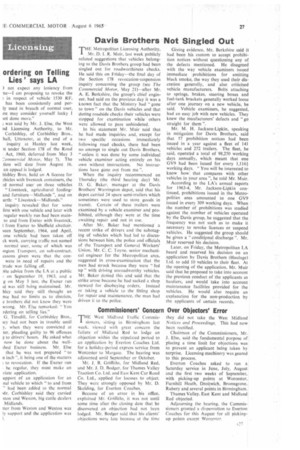Davis Brothers Not Singled Out
Page 29

If you've noticed an error in this article please click here to report it so we can fix it.
THE Metropolitan Licensing Authority, Mr. a I. R. Muir, last week publicly refuted suggestions that vehicles belonging to the Davis Brothers group had been singled out for roadworthiness checks. He said this on Friday—the final day of the Section 178 revocation-suspension inquiry concerning the group (see The Commercial Motor, May 21)—after Mr. A. E. Berkshire, the group's chief engineer, had said on the previous day it was a known fact that the Ministry had "gone to town" on the Davis vehicles and that during roadside checks their vehicles were stopped for examination while others were allowed to pass unhindered.
In his statement Mr. Muir said that he had made inquiries and, except for two specific occasions immediately following road checks, there had been no attempt to single out Davis Brothers, "unless it was done by some individual vehicle examiner acting entirely on his own without instructions. No instructions have One out from me ".
When the inquiry recommenced on Thursday (the third hearing day) Mr. D, G. Baker, manager at the Davis Brothers' Warrington depot, said that his depot carried 24 spare semi-trailers which sometimes were used to store goods in transit. Certain of these trailers were examined by a vehicle examiner and prohibited, although they were at the time awaiting repair and not in use.
After Mr. Baker had mentioned a recent strike of drivers and the sabotaging of vehicles which had led to discussions between him, the police and officials of the Transport and General Workers' Union, Mr. C. C. Toyne. senior mechanical engineer for the Metropolitan area, suggested in cross-examination that the men had struck because they were " fed up" with driving unroadworthy vehicles. Mr. Baker denied this and said that the strike arose because he had sacked a shop steward for disobeying orders. Instead of taking a vehicle to the fitting shop for repair and maintenance, the man had driven it to the police.
Giving evidence, Mr. Berkshire said it had been his custom to accept prohibition notices without questioning any of the defects mentioned. He disagreed with the way vehicle examiners issued immediate prohibitions for emitting black smoke, the way they used their discretion generally, and also criticised vehicle manufacturers. Bolts attaching to springs, brakes, steering boxes and fuel-tank brackets generally worked loose after one journey on a new vehicle, he said. Vehicle examiners, he suggested, had an easy job with new vehicles. They knew the maufacturers' defects and "go straight for them ".
Mr. M. H. Jackson-Lipkin, speaking in mitigation for Davis Brothers, said that 57 prohibition notices had been issued in a year against a fleet of 141 vehicles and 252 trailers. The fleet, he said, operated a total of 98,250 working days annually, which meant that one GV9 had been issued for every 1,1161 working days. " You will be interested to know how that compares with other vehicles in your area ", he told Mr. Muir.
According to the LA's annual reports for 1963-4, Mr. Jackson-Lipkin continued, prohibitions issued in the Metropolitan area amounted to one GV9 issued in every 309 working days. When the number of prohibitions was studied against the number of vehicles operated by the Davis group, he suggested that the frequency was not such as to make it necessary to revoke licences or suspend vehicles. He suggested the group should be given a "conditional discharge ". Mr. Muir reserved his decision.
Later. on Friday, the Metropolitan LA heard and reserved his decision on an application by Davis Brothers (Haulage) Ltd. to add 10 vehicles to their fleet. At the opening of the application. Mr. Muir said that he proposed to take into account the previous conduct of the applicants as hauliers, and would take into account maintenance facilities provided for the vehicles. He would also require an explanation for the non-production by the applicants of certain records.












































































































